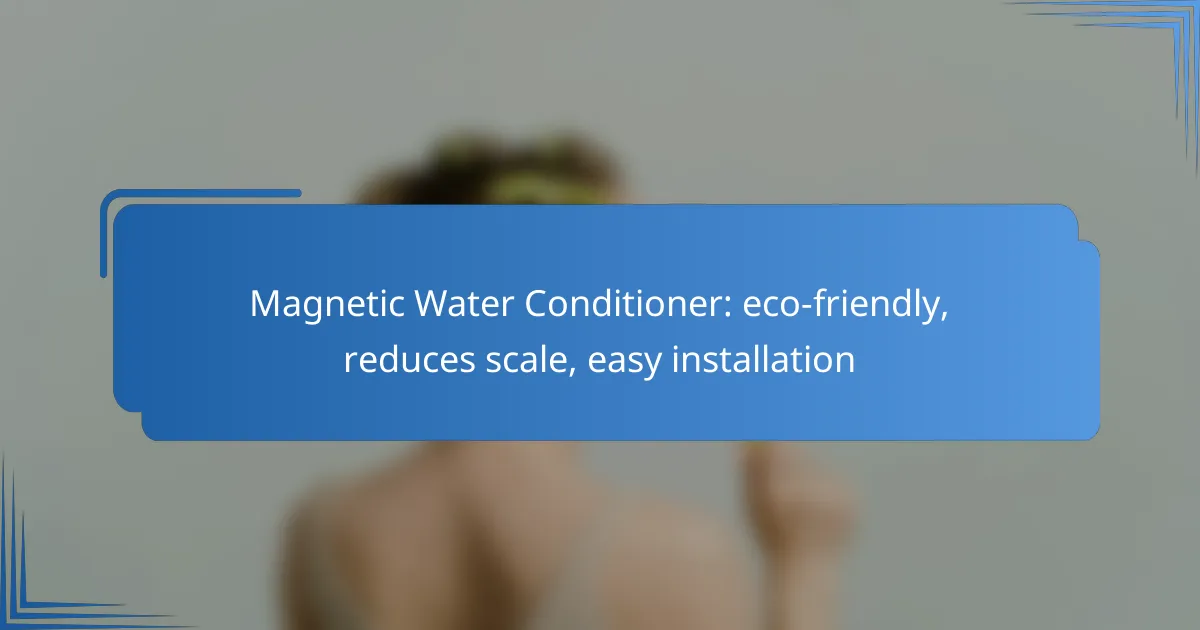A magnetic water conditioner is an eco-friendly solution that utilizes magnetic fields to alter the physical properties of water, effectively reducing scale buildup in plumbing and appliances. With its easy installation process that requires no chemicals or extensive maintenance, this system is an accessible option for homeowners seeking to improve their water quality.
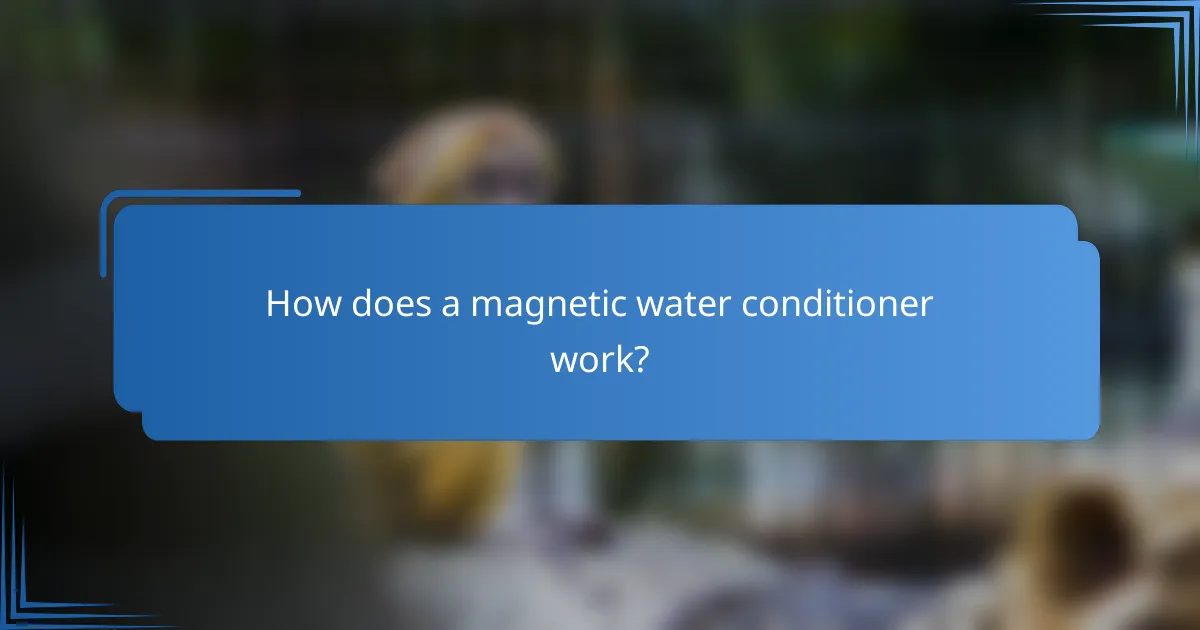
How does a magnetic water conditioner work?
A magnetic water conditioner works by using magnetic fields to change the physical properties of water, which can help reduce scale buildup in plumbing and appliances. This eco-friendly solution is easy to install and requires no chemicals or extensive maintenance.
Uses magnetic fields to alter water properties
Magnetic water conditioners create a magnetic field that influences the behavior of minerals in water, particularly calcium and magnesium. This alteration can prevent these minerals from forming hard deposits, which are commonly known as scale. The process is non-invasive and does not change the water’s chemical composition.
Installation typically involves placing the device around the water supply pipe, where it can generate the necessary magnetic field. This setup is straightforward and often requires no special tools or plumbing skills.
Prevents scale buildup in pipes and appliances
By altering the properties of water, magnetic water conditioners can significantly reduce scale buildup in pipes and appliances, extending their lifespan and improving efficiency. Homeowners may notice fewer clogs and reduced maintenance costs over time.
In practical terms, this means that appliances like water heaters and dishwashers can operate more efficiently, potentially saving energy and reducing utility bills. Regular use of a magnetic water conditioner can lead to cleaner fixtures and less frequent need for descaling treatments.
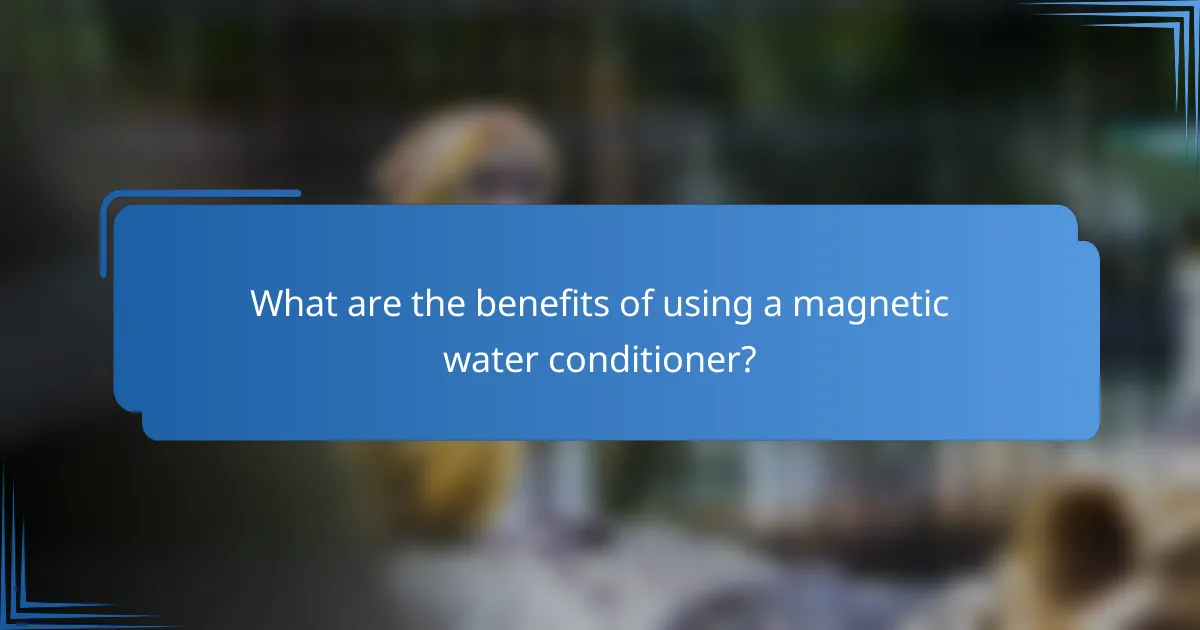
What are the benefits of using a magnetic water conditioner?
Magnetic water conditioners offer several advantages, including being eco-friendly, reducing scale buildup, and providing easy installation. These systems work by altering the properties of water, which helps prevent mineral deposits without the use of harsh chemicals.
Eco-friendly alternative to chemical treatments
Magnetic water conditioners serve as a sustainable option compared to traditional chemical treatments. They do not introduce harmful substances into the water supply, making them safer for both the environment and human health.
By using magnets to influence water’s physical properties, these systems effectively reduce scale without the need for chemical additives. This approach aligns with growing environmental concerns and regulations regarding water treatment practices.
Reduces energy costs by improving efficiency
Using a magnetic water conditioner can lead to lower energy costs by enhancing the efficiency of heating systems. When scale buildup is minimized, water heaters and boilers operate more effectively, which can result in energy savings of around 10-20%.
For homeowners, this means not only reduced utility bills but also a more consistent performance from appliances. Regular maintenance costs may decrease as well, since appliances will require less frequent servicing due to reduced scale-related issues.
Extends lifespan of plumbing and appliances
Installing a magnetic water conditioner can significantly extend the lifespan of plumbing systems and appliances. By preventing scale accumulation, these systems help maintain optimal water flow and reduce wear and tear on pipes and fixtures.
Homeowners can expect their water heaters, dishwashers, and washing machines to last longer, as they are less likely to suffer from the damaging effects of hard water. This longevity can lead to substantial savings over time by delaying costly replacements and repairs.
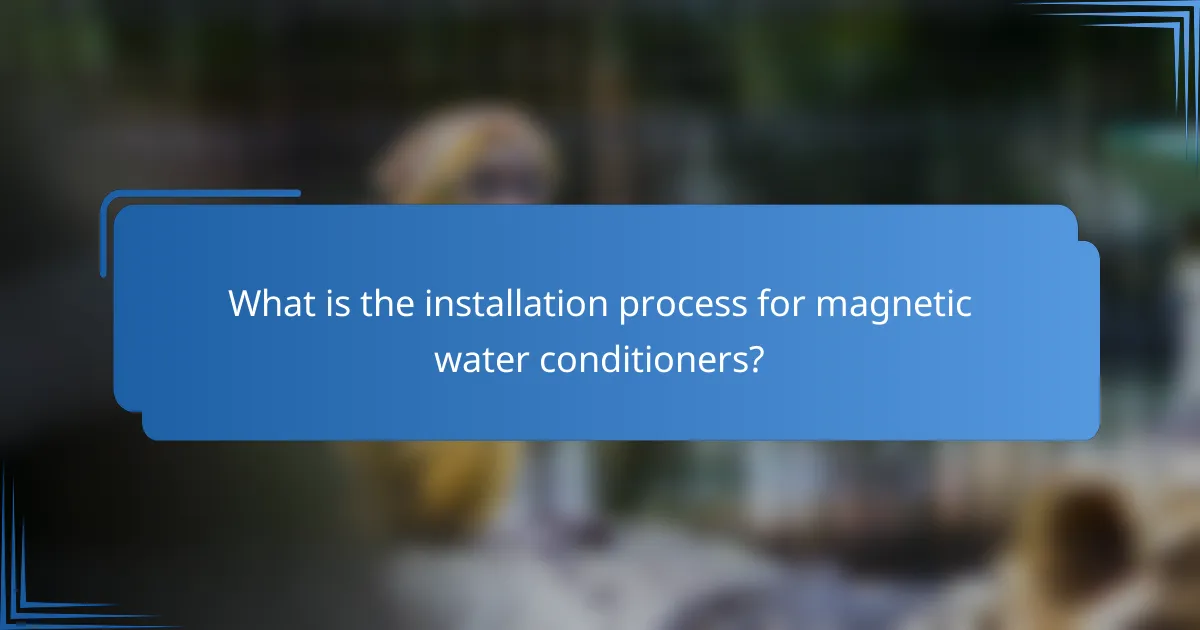
What is the installation process for magnetic water conditioners?
The installation process for magnetic water conditioners is straightforward and typically does not require any plumbing modifications. This makes it accessible for most homeowners looking to reduce scale buildup in their water systems.
Simple DIY installation without plumbing modifications
Magnetic water conditioners can be installed easily without altering existing plumbing. Most units come with clear instructions and can be mounted on the main water supply pipe using simple tools like a screwdriver and zip ties or clamps.
To install, simply wrap the magnetic coils around the pipe, ensuring they are positioned correctly according to the manufacturer’s guidelines. This method allows for effective treatment of water without the need for professional assistance.
Installation time typically under an hour
The entire installation process usually takes less than an hour, making it a quick solution for homeowners. Most people can complete the setup in about 30 to 45 minutes, depending on their familiarity with basic tools.
To expedite the process, gather all necessary tools and components beforehand. Avoid common pitfalls like misaligning the magnetic coils, which can reduce effectiveness, and ensure that the unit is securely fastened to prevent movement over time.
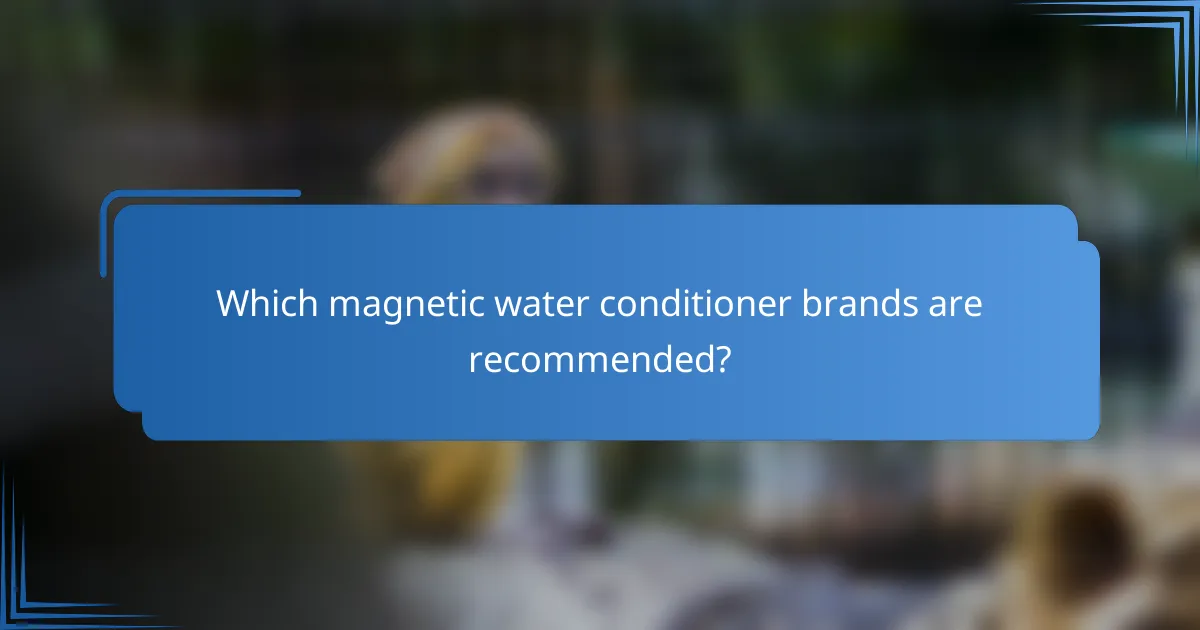
Which magnetic water conditioner brands are recommended?
Recommended brands for magnetic water conditioners include Magniflow and Scalewatcher, both known for their effectiveness in reducing scale and ease of installation. These brands cater to different applications, ensuring users can find a suitable option for residential or commercial needs.
Magniflow for residential use
Magniflow is designed specifically for residential applications, providing an eco-friendly solution to scale buildup in home plumbing systems. It operates by using magnetic fields to alter the properties of minerals in the water, preventing them from forming scale deposits.
Installation is straightforward, typically requiring no special tools or plumbing skills. Users can expect to see improvements in water quality and reduced maintenance on appliances like dishwashers and water heaters within a few weeks of installation.
Scalewatcher for commercial applications
Scalewatcher is tailored for commercial settings, effectively managing scale in larger systems such as hotels, restaurants, and industrial facilities. Its technology utilizes a unique electromagnetic field to disrupt scale formation, which can lead to significant savings on maintenance and energy costs.
When considering Scalewatcher, it’s essential to evaluate the size of your water system and the specific needs of your business. Many users report a noticeable reduction in scale-related issues, contributing to longer equipment lifespans and improved operational efficiency.
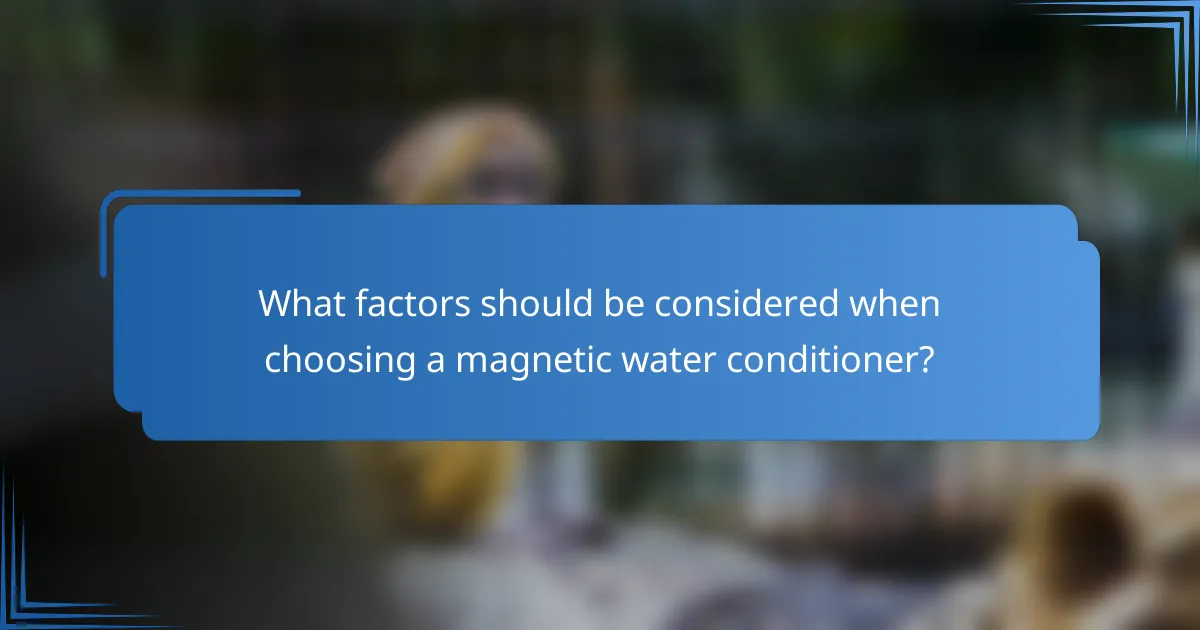
What factors should be considered when choosing a magnetic water conditioner?
When selecting a magnetic water conditioner, consider water hardness levels and compatibility with your existing plumbing systems. These factors will significantly influence the effectiveness and installation of the device.
Water hardness levels in your area
Understanding the water hardness levels in your area is crucial when choosing a magnetic water conditioner. Hard water, which contains high levels of calcium and magnesium, can lead to scale buildup in pipes and appliances. A conditioner designed for your specific hardness level will be more effective in reducing scale and improving water quality.
To determine your water hardness, you can use a home testing kit or check with your local water utility. Generally, water hardness is measured in parts per million (ppm) or grains per gallon (gpg), with soft water being below 60 ppm and hard water exceeding 120 ppm.
Compatibility with existing plumbing systems
Ensure that the magnetic water conditioner you choose is compatible with your existing plumbing systems. Most conditioners are designed to work with various pipe materials, including copper, PVC, and PEX. However, it’s essential to verify that the model you select can be easily installed without requiring significant modifications to your plumbing.
Additionally, consider the size and flow rate of your plumbing system. A conditioner that is too small may not effectively treat the water for larger households, while one that is too large could be unnecessary for smaller systems. Check the manufacturer’s specifications to match the conditioner with your plumbing needs.
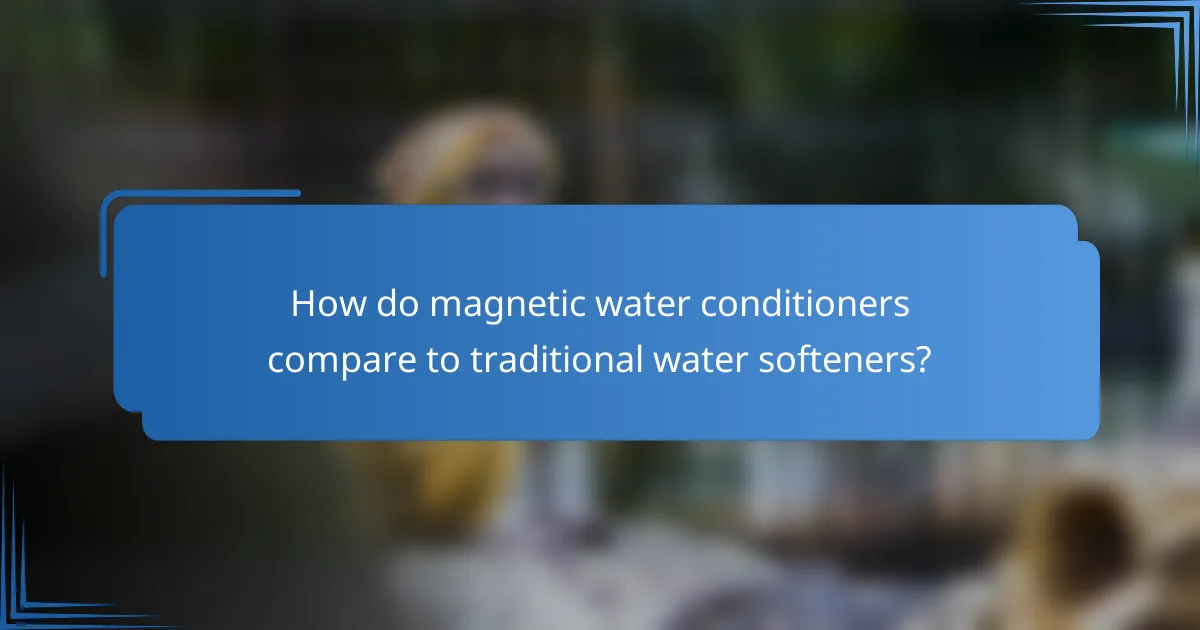
How do magnetic water conditioners compare to traditional water softeners?
Magnetic water conditioners offer a different approach to managing hard water compared to traditional water softeners. While softeners typically use salt to remove minerals, magnetic conditioners alter the properties of these minerals, reducing scale buildup without the need for chemicals.
Lower maintenance requirements
Magnetic water conditioners generally require less maintenance than traditional water softeners. Since they do not rely on salt or chemicals, there are no tanks to refill or filters to replace regularly. This simplicity can save both time and effort for homeowners.
Additionally, magnetic systems often have a longer lifespan because they lack moving parts that can wear out. This durability means fewer repairs and replacements, making them a practical choice for many households.
No salt or chemicals needed
One of the key advantages of magnetic water conditioners is that they do not require salt or chemicals to function. This eliminates the need for purchasing and storing salt bags, which can be cumbersome and messy. It also means that there are no additional costs associated with chemical treatments.
Furthermore, using a magnetic system is more environmentally friendly. Without the discharge of salt or chemicals into the water supply, these conditioners help maintain local water quality and reduce the risk of corrosion in plumbing systems.
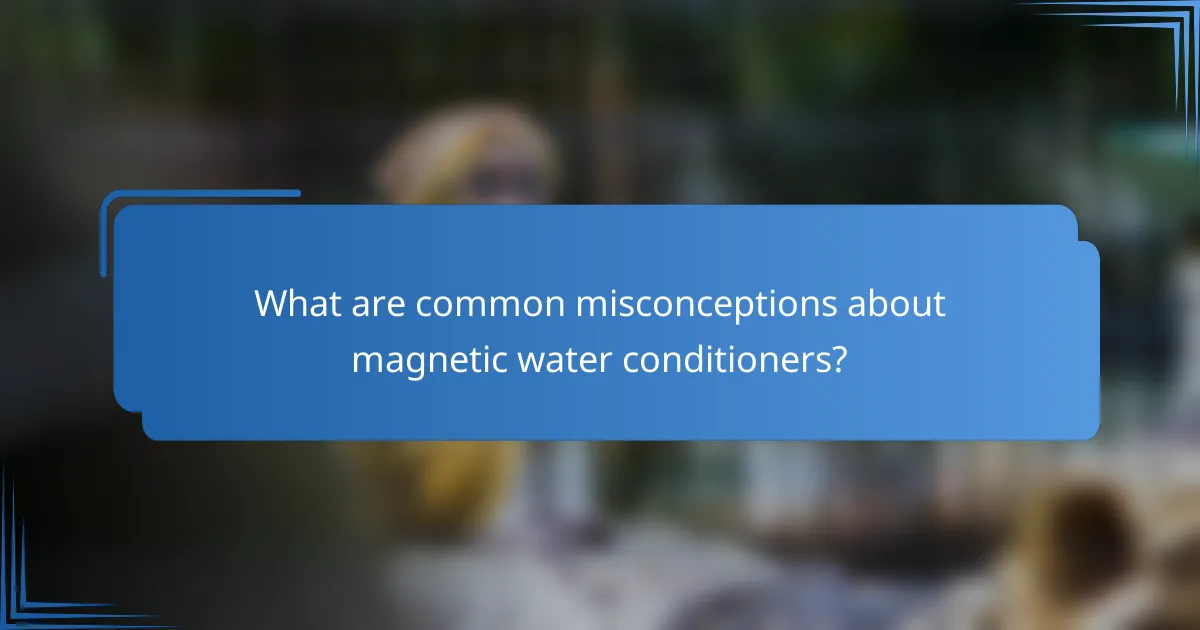
What are common misconceptions about magnetic water conditioners?
Many people mistakenly believe that magnetic water conditioners are ineffective or that they require extensive maintenance. In reality, these devices can significantly reduce scale buildup and are designed for easy installation and low upkeep.
Effectiveness compared to chemical softeners
Magnetic water conditioners work by altering the properties of minerals in water, which can help prevent scale formation. Unlike chemical softeners that replace calcium and magnesium ions with sodium, magnetic systems aim to modify how these minerals behave, making them less likely to adhere to surfaces.
While chemical softeners can provide immediate results in reducing hardness, magnetic conditioners may take longer to show effects, often requiring several weeks of consistent use. Users should consider their specific needs and the severity of their water hardness when choosing between these options.
In practical terms, magnetic conditioners can be a more eco-friendly choice, as they do not introduce chemicals into the water supply. However, for those with extremely hard water, a traditional softener may still be necessary for optimal results.
